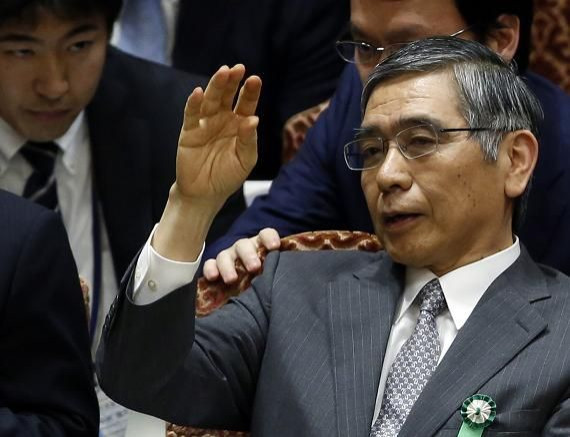Bank Of Japan, With New Leader Haruhiko Kuroda, Launches Huge Monetary Stimulus Program To Lift Economy Out Of 15 Years Of Deflation

The Bank of Japan, in its first meeting under the leadership of Haruhiko Kuroda, stunned observers Thursday by announcing a massive initiative to cut the economy's interest rate and dramatically expand the nation's money supply in the hope of pulling the world's No. 3 economy out of more than a decade of deflation.
The plan, which resembles what the Federal Reserve has been doing in the U.S., marks a dramatic reversal of the relatively cautious policies pursued by the central bank under its previous head, Masaaki Shirakawa.
The bank said in a statement that it "will enter a new phase of monetary easing both in terms of quantity and quality. It will double the monetary base and the amounts outstanding of Japanese government bonds as well as exchange-traded funds in two years." Further, the BoJ will purchase bonds of longer duration to lower the interest rate at the far end of the yield curve.
Specifically, it will expand the monetary base by 60 trillion yen ($630 billion) to 70 trillion yen of Japanese government bonds each year. The bank also will launch open-ended asset purchases and buy more than 7 trillion yen of long-term government bonds per month so the balance of its bond holdings grow at a rate of 50 trillion yen per year.
The effect of the announcement on markets was swift: the interest rate on the benchmark Japanese 10-year bond dropped to 0.5 percent, its lowest level in nearly 10 years, the U.S. dollar surged against the yen and Japanese stocks shot up nearly 3 percent.
The scope of the announced plan surprised -- and delighted -- analysts.
"The result is nothing short of regime change," Izumi Devalier, Japan economist for HSBC, said. "The BoJ announced sweeping changes to its monetary policy framework today and delivered aggressive easing measures that exceeded even the most optimistic market expectations. The BoJ has now made a much firmer commitment to achieving its 2 percent inflation goal, and has demonstrated that it will do anything short of foreign-bond buying to achieve this goal. Call it a big bang."
Capital Economics’ chief global economist, Julian Jessop, had expected the bank to announce an additional 10 trillion yen in Japanese government bond purchases under the asset purchase program for 2013, which represents a 50 percent increase in the amount of Japanese government bond purchases planned for this year.
Japan’s central bank has long been criticized for its relatively conservative monetary policies, and it is now under tremendous pressure to stimulate growth and inflation in an economy that has suffered deflation for 15 years and four recessions since 2000.
Prime Minister Shinzo Abe, who took office in December, has pushed for big government spending and called for aggressive monetary easing by the Bank of Japan. Since Abe first pledged to turn around the nation's flagging economy in November, the Nikkei 225 rose about 34 percent and the yen fell around 15 percent against the dollar.
The yen's depreciation, the rise in stocks and the decline in long-term yields since the start of the Abe administration have stemmed largely from expectations for changes in the bank's policy regime.
© Copyright IBTimes 2024. All rights reserved.






















